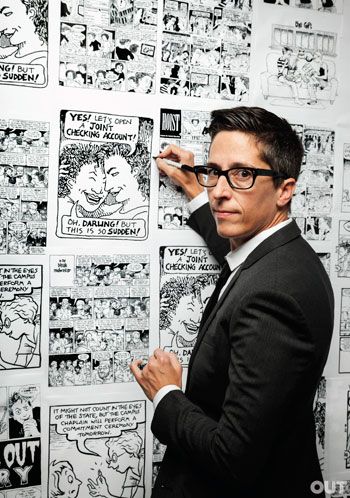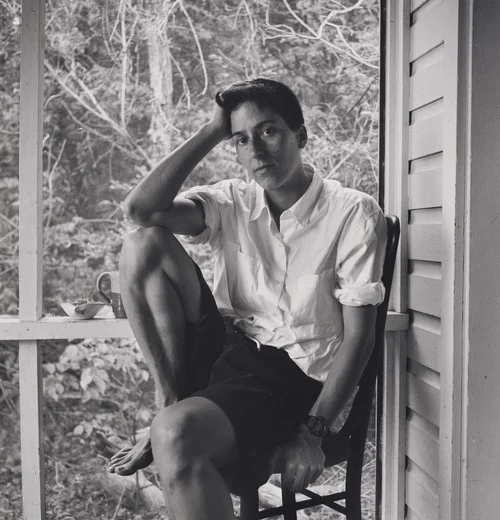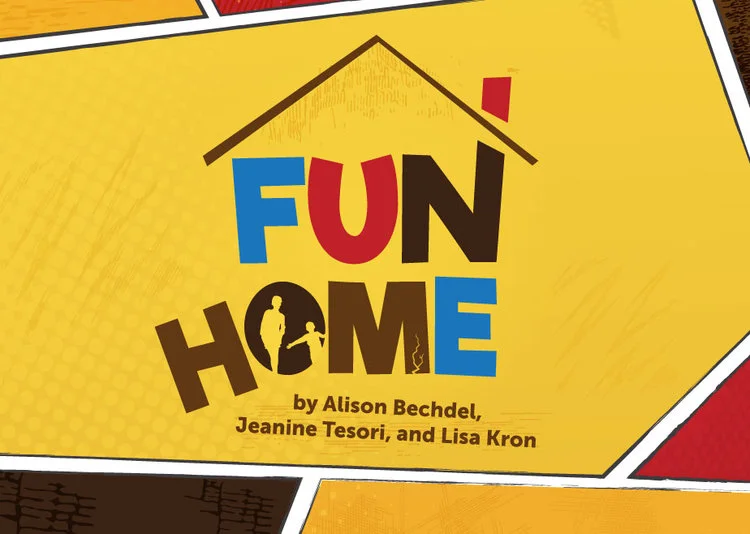Alison Bechdel, Photo by M. Sharkey for Out
When cartoonist Alison Bechdel’s Fun Home: A Family Tragicomic was published in 2006, her graphic novel memoir changed the climate for telling lesbian stories in mainstream culture. She uniquely contributed to shining light on lesbian narratives and the novel sent shockwaves through the world of queer culture, instantly becoming a top shelf read in queer and gender studies classes. Alison’s project to bring lesbian stories out of the shadows began not long after she graduated from Oberlin College in the early 1980s. Her first comic strip, Dykes to Watch Out For, was a collection of stories following a cast of lesbians through real life events from 1986 to 2008. Writing these strips inevitably gave Bechdel the tools to tackle her own graphic novel memoir which vividly recounts her young formative years in small town Pennsylvania, her sexual awakening in college and the subsequent suicide of her closeted gay father.
“The Rule” strip from Alison Bechdel’s Dykes to Watch out For collection.
Seven years after the graphic novel’s critically acclaimed release, the book writer, Lisa Kron, and composer, Jeanine Tesori, adapted Bechdel’s comic memoir into this musical. It first premiered at The Public Theater in New York in the fall of 2013. After a hugely successful run that extended several times into January 2014, the musical transferred to Broadway and debuted in October 2015. It went on to win five Tony awards including Best Score, Best Book, and Best Musical. Tesori and Kron collaborated on the book and score out of a deep personal passion to tell Alison’s story and for how her story more fully humanized the butch lesbian, bringing this oft-stereotyped identity to the center of the narrative.
Within mainstream culture, the butch lesbian has been narrowly defined as a “woman who presented masculine characteristics.” But the reality is much more varied and multifaceted than that, and the history of the butch’s presence in society is complex. The word “butch” has a rich backstory. In the 1940s, the term was used by working-class lesbian women within their own communities to describe women who, as queer scholar Gayle Rubin notes, “identify primarily as masculine or prefer masculine signals, personal appearance, and styles.” By the 1970s, with the rise of the Feminist and Gay Liberation movements, butches were marginalized, even within their own community. During the 80s and 90s, “butch” and “femme” categories made a resurgence, used as sexually empowering terms that were embraced by the community, and by the 1990s and 2000s, butch visibility became much more legible within mainstream culture.
(Roger Ressmeyer/Getty Images)
But what exactly is the definition of a butch? As with many LGBTQ+ terms, there are ongoing debates, but many agree that butch is a gender non-conforming state of mind. Butches have a style, swagger, and confidence that plays with gender expectations and turns those expectations on its head. It’s an attitude and a way of being in the world that is strong and independent. Society, gay or straight, is continuously perplexed by the butch’s inability to fit comfortably inside a particular socially constructed box of identity, and as a result, they have been marginalized.
Alison Bechdel, 1995, photo by Robert Giard
What makes Fun Home particularly noteworthy is the way it dimensionalizes the butch lesbian. As book writer Lisa Kron says: “...the portrayal of 'butchness' in the show, from the very beginning, was something that I was very concerned about how we would succeed at doing it. It's an elusive thing. It's not about maleness. It's something else. If you understand that dynamic, it's very clear to you what it is. If it's not something you've encountered, in my experience, it's something that's actually hard to make clear what it is.” In the ballad “Ring of Keys,” 10-year old Alison first begins to recognize her own identity as she notices a masculine delivery woman and her huge ring of keys. As young Alison paints a moving portrait of this “old school butch,” the butch, in all of her rich, human complexity, springs to life in the imaginative minds of the audience. And in this way, the first mainstream butch anthem was born.
Fun Home takes place over three different time periods, spanning more than thirty years in Alison’s life from age 10 to 43. Alison looks back through her memories to better her relationship with her repressed gay father, Bruce, and to try to understand why he didn’t leave her mother and come out of the closet. To more fully understand this, we must look at how history and its events shaped the world at that time when Alison was growing up, and how the social time impacted these characters’ decisions.
Excerpt from Fun Home: A Family Tragicomic
For homosexuals in post-World War II America, there were no other options available to them then to ‘pass’ into the nuclear family. During these tumultuous years for the queer community, the criminalization of homosexuality was at its most rampant. Government leadership between 1947 and 1961 lead to a nationwide ‘Pink Purge’ in an effort to establish nationwide security against the threat of communism. Cloaked in the flag of patriotism, the country proceeded to vilify, fire, condemn, and commit over 5,000 homosexuals in just the first several months of this dark time for homosexuals.
The medical health field reinforced the U.S. Government’s position on homosexuality. Dr. Charles W. Socarides, a psychiatrist who was famous mostly for being an early proponent of the theory that homosexuality is a mental illness, had this to say about homosexuality in the 1960s: "The average homosexual, if there be such, is promiscuous…he is not interested in or capable of a lasting relationship like that of a heterosexual marriage…I think the whole idea of saying ‘the happy homosexual’ is to create a mythology about the nature of homosexuality…it is in fact a mental illness, which has reached epidemiological proportion.”
Gay activists protest after the Stonewall Rebellion. Photo by Leonard Fink
To understand the lengths to which society and the U.S. Government went to vilify homosexuality is to understand the confines of Bruce Bechdel’s life as a gay man, expected to uphold the nuclear family by social forces much bigger than him. Gay men had very little choice except to pass and hide -- or come out and fear dire social consequence. This lack of choice is another key factor in Bruce’s decision (or lack of a decision) to claim his own identity.
Fun Home has profoundly contributed to an ongoing effort to bring the stories of lesbian and gay characters into the spotlight. It has changed the way we think and talk about butch lesbians, and it brings visibility to an important subculture within the lesbian community. With haunting hindsight and arresting contemporary commentary, this groundbreaking, intimate, illuminating musical provides us with new perspectives around gender and sexuality that open us up to a fuller, more complete understanding of the complexity of the human experience across time and space.
ABOUT THE SHOW
Alison Bechdel’s iconic graphic novel comes to life in this Tony Award-winning masterpiece musical. Follow her journey of self-discovery as Alison recounts the mysteries of her childhood with her father in the family funeral home. Coming to understand her past leads her on a path of self-discovery and her own journey as an LGBTQ writer, artist, and woman. Join Virginia Stage for this groundbreaking musical enjoyed by play and musical lovers alike that brings forward aspects of our society that do not often take center stage.









